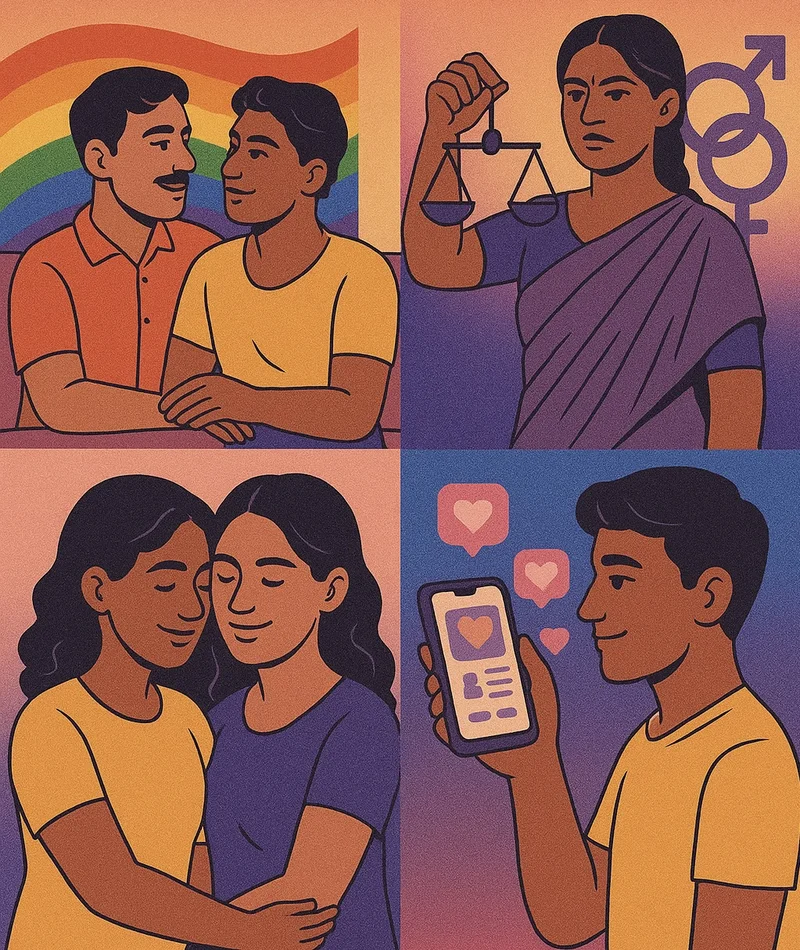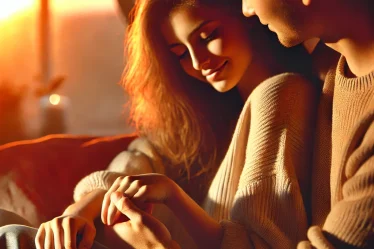
In a country as culturally diverse—and often conservative—as India, dating is rarely simple. Add queerness to the equation, and it becomes a unique tapestry of resilience, risk, and hope. While the decriminalization of Section 377 in 2018 marked a historic moment for LGBTQ+ rights, the journey of queer dating in India is far from over. For many, it is still a mix of navigating digital spaces, hiding identities, fighting stigma, and celebrating small wins in love and acceptance.
At Mate4All, we believe in inclusive love. This article explores what it’s like to date while queer in India today—the progress made, the pain still endured, and the growing promise of a better, safer future.
The Legal and Cultural Landscape of Queer Dating in India
In September 2018, the Supreme Court of India struck down Section 377, finally decriminalizing consensual same-sex relationships. For the queer community, this wasn’t just a legal victory—it was a validation of existence.
However, legality doesn’t always guarantee acceptance. Across urban and rural India, deeply ingrained cultural norms around gender, sexuality, and family honor continue to stigmatize queer relationships. Coming out remains a privilege in many communities, where queer individuals face emotional coercion, forced heterosexual marriages, or even violence.
Moreover, India’s vast cultural fabric means that the queer experience isn’t uniform—it intersects with class, caste, religion, and region. What feels safe in Mumbai might feel impossible in Bhopal or Guwahati.
The Rise of Queer Dating Apps in India
As traditional matchmaking fails to accommodate queer identities, online platforms have stepped in to bridge the gap. Popular Apps have seen growing usage among LGBTQ+ Indians, offering discreet ways to connect.
More significantly, India has witnessed the rise of homegrown queer apps like As You Are (AYA) and Delta, which provide a safer, community-oriented dating experience specifically for queer Indians.
However, digital dating isn’t without its pitfalls:
- Catfishing and impersonation
- Harassment and blackmail
- Limited visibility in smaller towns
- Algorithmic bias favoring heteronormativity
Despite these challenges, dating apps have become essential tools for exploring identity, finding partners, and building queer community online.
Safety, Identity, and the Politics of Visibility
For many queer Indians, dating is not just about love—it’s about survival. Safety is a constant concern, especially in places where queerness is still taboo.
Many users:
- Avoid using profile pictures
- Use gender-neutral language
- Arrange first meetings in public places
- Rely on digital safety features (blocking/reporting)
Some face blackmail and extortion, especially on anonymous apps where people are outed or threatened with exposure. These threats underscore the need for both better digital protection and more widespread LGBTQ+ sensitization.
Coming out through dating often becomes a personal negotiation between authenticity and protection—especially for trans and non-binary individuals whose identities are even more marginalized.
Queer Love in Indian Media and Pop Culture
In recent years, Indian media has played a significant role in normalizing queer relationships. Web series like Made in Heaven, Four More Shots Please!, and movies like Shubh Mangal Zyada Saavdhan have helped bring LGBTQ+ narratives into the mainstream.
Celebrities and influencers—like Dutee Chand, Kusha Kapila, and Sushant Divgikar—have publicly embraced queer identities, offering visibility and hope.
This growing representation:
- Encourages acceptance among younger audiences
- Challenges outdated stereotypes
- Makes queer love aspirational—not just political
But representation must go deeper. We still need intersectional, nuanced portrayals—stories of love that reflect regional diversity, economic realities, and trans and asexual identities.
Building Queer-Friendly Communities and Spaces
Despite legal wins, physical spaces for queer dating in India remain rare. Still, the community continues to carve out safe zones in:
- LGBTQ+ cafes and bars in cities like Delhi, Mumbai, and Bangalore
- Pride marches and queer film festivals
- Support groups and collectives like Humsafar Trust, Naz Foundation, and Gaysi Family
These spaces offer more than romance—they offer validation, support, and belonging.
Online, communities are thriving through:
- Instagram collectives
- Reddit groups like r/queerIndia
- YouTube channels run by queer content creators
As queer Indians continue to date and love, both online and offline, these networks become crucial in replacing shame with solidarity.
The Path Forward: What Needs to Change
The queer dating landscape in India is changing—but not fast enough. Here’s what must happen to make dating truly inclusive:
- Marriage equality and legal protections against discrimination
- Inclusive sex education in schools and universities
- Sensitization in law enforcement to tackle blackmail and harassment
- Corporate diversity policies that go beyond tokenism
- Better moderation and safety features on dating apps
Above all, we need a culture shift—from tolerance to celebration.
Conclusion: Loving Loud, Living Proud
Dating while queer in India is still a radical act. It’s an act of courage, self-expression, and hope. While challenges persist, progress is undeniable. More people are coming out. More love stories are being told. More spaces are being carved out.
At Mate4All, we celebrate all kinds of love—and we’re proud to be part of your journey. Whether you’re exploring your identity or looking for your soulmate, know this: you deserve a love that’s equal, safe, and real.
Looking to Date Queer and Proud?
Join the Mate4All community today—where love knows no labels.
🙋♂️ FAQs
Q1. Is queer dating legal in India?
Yes, queer dating is legal in India. The Supreme Court of India decriminalized consensual same-sex relationships by repealing Section 377 in 2018. However, same-sex marriages and certain civil rights for LGBTQ+ couples are still not legally recognized.
Q2. What challenges do LGBTQ+ people face while dating in India?
Despite legal progress, LGBTQ+ individuals in India still face social stigma, lack of family support, fear of being outed, online harassment, and limited access to safe public spaces. Dating discreetly and securely remains a major concern, especially outside metropolitan areas.
Q3. Are there dating apps specifically for the LGBTQ+ community in India?
Yes. In addition to global apps like Mate4all, has LGBTQ+-specific dating apps like As You Are (AYA) and Delta App, which provide safer and more inclusive environments for queer users to connect.
Q4. How can queer individuals date safely in India?
To date safely in India, queer individuals should:
Rely on community support when needed
Use dating apps with privacy features
Avoid sharing personal information too soon
Meet in public places
Trust their instincts
Q5. What are the safest cities in India for queer dating?
Cities like Mumbai, Delhi, Bangalore, and Pune are relatively more LGBTQ+-friendly due to active queer communities, pride events, and inclusive public spaces. However, safety still depends on social and family dynamics.
Q6. How is Indian media influencing queer dating culture?
Indian media has increasingly started portraying queer relationships through films and web series, helping normalize LGBTQ+ love. Shows like Made in Heaven and films like Shubh Mangal Zyada Saavdhan contribute to greater visibility and societal acceptance.
Q7. What support resources are available for queer individuals in India?
Several organizations and collectives support queer individuals, including:
- Naz Foundation
- Humsafar Trust
- Gaysi Family
- Sweekar – The Rainbow Parents
These groups offer counseling, legal help, and safe spaces.
8. What’s the future of queer dating in India?
The future of queer dating in India looks hopeful, with increasing awareness, youth activism, and tech-driven inclusivity. However, legal recognition of same-sex unions, anti-discrimination laws, and wider cultural acceptance are essential for meaningful progress.



